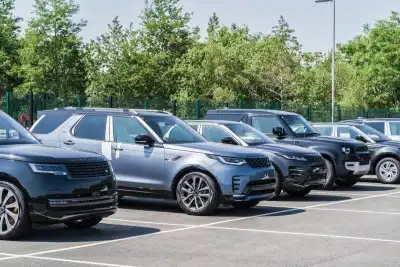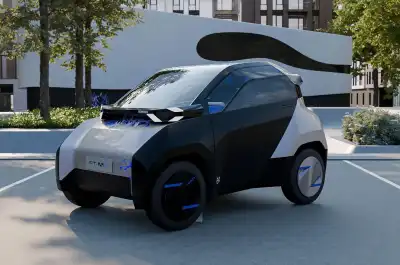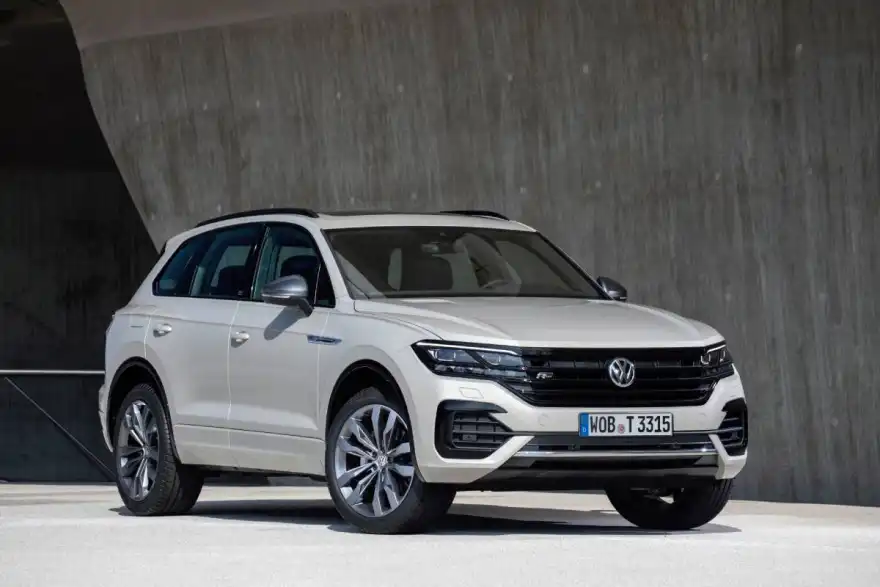
Until now, there haven’t been many viable options – and even today, you’re still limited in choice.
There are several reasons for this. The primary ones are that many electrified vehicles have tyres and brakes that aren’t designed to cope with the combined weight of a caravan and an electric car, which is often heavier than a petrol or diesel equivalent, due to the mass of the batteries.
This enormous weight also means that the range of an electric vehicle towing a caravan would be too limited to be of any use, especially given that those with caravans typically want to take them on long trips.
In addition, the approval of any vehicle to tow something must be sought at the start of a model’s life – it can’t be ‘added on’ at a later date. And, given the above limitations, most manufacturers haven’t sought this approval.
However, battery technology is improving, so many electric cars are now cracking the 300-mile barrier, albeit when not towing anything.
This is finally resulting in us getting some electrified cars which can do more than pull the skin off a bowl of cold custard – and get you the distance, too.
If you’re opting for all-electric, most manufacturers’ range figures don't account for towing. So, although we’ve quoted them where relevant, don’t expect to get anywhere near them. Indeed, it’s best to assume you’ll lose up to half the claimed figure.
Plug-in hybrids, particularly all-electric cars, usually command a hefty premium, too. For now, then, we’d still recommend sticking to hybrids unless the purpose of buying a caravan is to accommodate your enormous wallet.
Porsche Cayenne (Plug-In Hybrid)
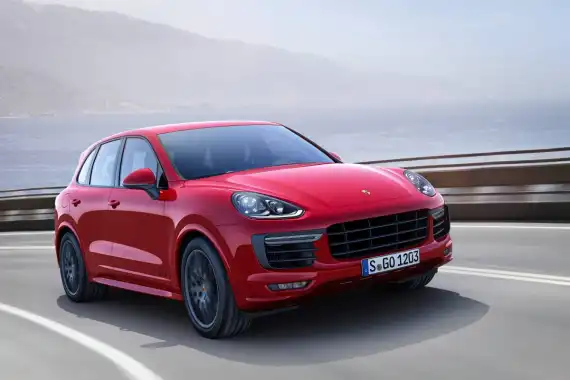
With a mighty 3,500kg of pulling power, the Porsche Cayenne SUV is the joint big daddy of this contest.
Granted, such towing capability may be overkill, so this doesn't mean the Cayenne is the best fit for all.
But, along with the next car on the list, it’s the winner when it comes to towing the maximum amount possible amongst hybrids and electric vehicles.
With it, you’ll get a 3.0-litre, 462PS powertrain that manages 91mpg, which isn’t exactly lacking, while it can do 83mph on all-electric power (not while towing, mind).
On top of that, it's four-wheel drive, and you get a luxurious interior packed full of kit, which is arguably class-leading.
Cayennes aren’t cheap, and at around £72,500, the hybrid version is ten grand more expensive than the entry-level petrol version.
In addition, while it's not short on equipment, Porsche holds some of its best features back, and, as a result, the automaker has one of the most extensive options lists.
You will likely be tempted into parting with even more cash before driving away in one.
Volkswagen Touareg (Plug-In Hybrid)
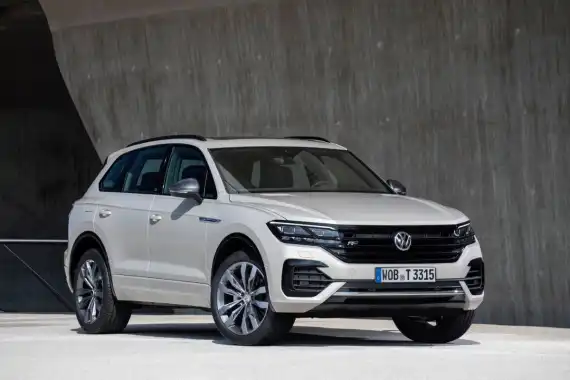
If the Cayenne is too much, then you could consider the Touareg.
With a mighty 3,500kg of pulling power, the VW Touareg SUV shares the Cayenne’s accolade of being the champ at the weightlifting contest.
It shares a lot more with the Cayenne, too, because, with the same powertrain, it’s effectively a Cayenne with a VW badge.
The Volkswagen offers more dynamic looks than Touaregs of old, has a well-designed leather interior, 22-inch wheels, air suspension, adaptive chassis control and a digital cockpit.
Annoyingly, while the entry-level petrol costs £55,000, only the ‘R’ version is a hybrid, costing a whopping £77,000. So, unbelievably, it’s more expensive than the Porsche.
In fairness, the ‘R’ version is the top-of-the-range Touareg, so you'll get more kit for your money. But who’s going to buy a pricier VW over a cheaper Porsche?
Hopefully, Volkswagen will expand the hybrid offering to the rest of the range. It needs to because it has so much going for it.
Were it closer to the entry-level price, we could have a winner.
BMW iX (Electric)
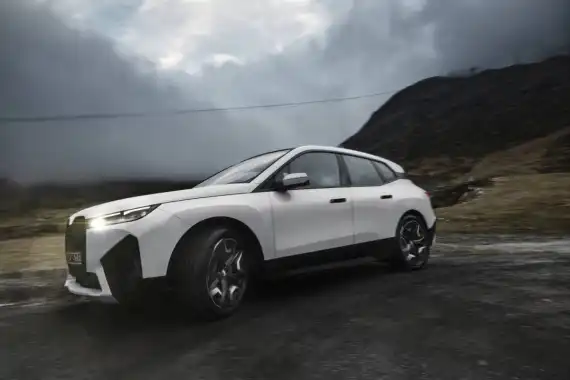
The new all-electric mid-size SUV from BMW currently leads the way in the towing stakes because it can haul 2,500kg.
It has a range of 348 miles with a recharge speed of 200kW, while numerous powertrains can, when not towing, get from 0-62mph in as little as 3.8-seconds.
The iX comes with a futuristic interior that’s well designed and well built, as we’ve come to expect from BMW.
Unfortunately, it’s over £77,000 – excluding the caravan.
Tesla Model X (Electric)
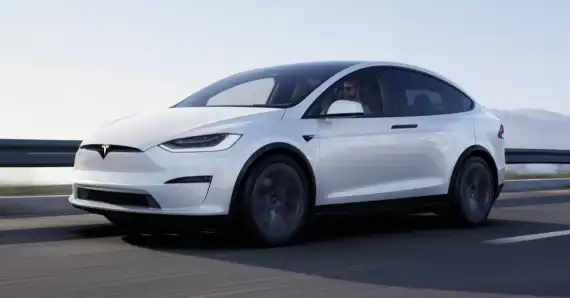
The biggest Tesla in the range gives the iX a run for its money but ultimately comes up short. Nevertheless, its towing limit of 2,268kg should suffice for most.
Whereas the fastest iX will get up to 62mph in 3.8-seconds, the slowest Model X will manage the same in 3.9-seconds (the quicker Plaid version is 2.5-seconds). Of course, we don't recommend trying this with a caravan, but at least that demonstrates its power.
You will get around 340 miles of range when not towing, and the interiors of Teslas take some beating if you like stylish minimalism.
If this sounds more appealing than the BMW, the standard model is £82,000 – which doesn't include any clever Autopilot gadgetry.
Mercedes-Benz E-Class (Plug-In Hybrid)
The dependable E-Class might be a surprise inclusion in this list, but it punches above its weight in the towing stakes.
The hybrid combines a 2.0-litre four-cylinder – available as a petrol or, unusually for a hybrid, a diesel engine – with an electric motor, producing a total of 320PS and 306PS, respectively.
It can pull up to 2,100kg, a figure which applies to the saloon and estate variants, although the latter will allow for storage space closer to the SUVs we’ve mentioned.
Mercs aren’t inexpensive, however. This one costs from £54,000 for the saloon and £57,000 for the estate. Mind you, that’s still significantly more affordable than the BMW or Tesla.
Its main rival, the BMW 5 Series, also performs well, capable of towing 2,000kg, and is worth considering as an alternative.
Ford S-Max (Self-Charging Hybrid)
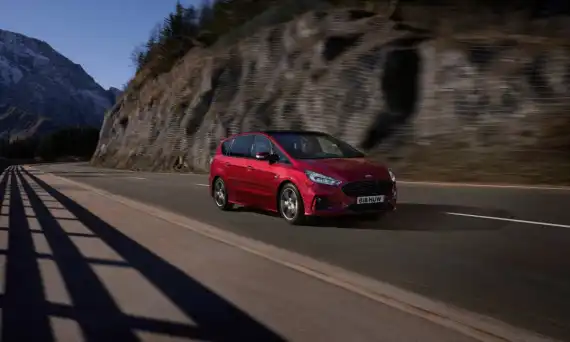
Although SUVs appear to be dominating the market now, the S-Max is a stylish people carrier. Moreover, it carries an air of exclusivity, given so many people are opting for the 4x4 look these days.
With a maximum towing weight of 2,000kg, it's versatile, practical and good-looking, with the powertrain producing 190PS combined from the electric motor and a 2.5-litre petrol engine.
The Ford doesn’t have the luxuriousness of BMW, Tesla, and Mercedes-Benz, but with prices starting from £38,540, it’s excellent value for money by comparison. However, it won't offer the same savings as plug-in hybrids and fully electric cars.
The biggest problem with the S-Max is buying one. Ford has temporarily suspended its production due to high demand and the global shortage of microchips, affecting all manufacturers. But hopefully, it'll be back on sale soon.
Skoda Superb Estate (Plug-In Hybrid)
With 218PS, up to 245mpg and a price of around £38,500, the Skoda Superb Estate could be the pick of the bunch.
Before you turn your nose up at the badge, Skoda produces excellent cars nowadays, easily competing with the likes of Volkswagen.
It is practical and well-equipped, with smart looks and a nice interior design.
Frustratingly, there had to be a downside – and it’s in the form of the towing capacity.
Because of the extra weight of the hybrid system, while some Superb models can pull 2,000kg, the hybrid can only manage 1,600kg.
------
So, as you can see, for the moment, finding suitable hybrid and all-electric tow vehicles is still an expensive endeavour.
If you do a lot of travelling with a caravan attached, then opting for these eco-friendlier cars could save you money in the long term.
Given the limitations we mentioned initially, it's not surprising that the electrified-towing market has been a slow burner. But it should start to pick up the pace soon.
If you don’t need to buy one right away, then new vehicles are coming along all the time, and the choice will likely expand significantly over the next two to three years.

